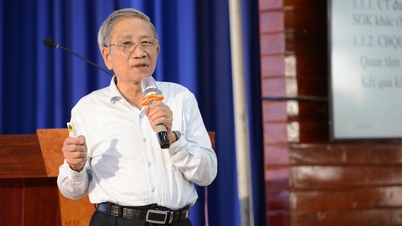The question is should we maintain the high school graduation exam?
Dr. Hoang Ngoc Vinh, former Director of the Department of Vocational Education ( Ministry of Education and Training ), said that the current issue is not only whether to keep or remove this exam, but how to make an exam effectively serve two different goals.
According to Mr. Vinh, there are three main options being discussed.

First , organize two separate exams: one for high school graduation and one for university entrance. This plan is clear in its goals but difficult to implement because it wastes budget and human resources, creates double pressure on students and repeats the widespread practice of exam preparation. Many universities also do not have the capacity and conditions to organize their own standardized exams.
Second , completely eliminate the high school graduation exam and assign the task of assessing and recognizing graduation to schools.
However, this solution is inadequate when there is no independent quality assurance system, graduation recognition based only on internal assessment can easily lead to loss of trust, unfairness and cause difficulties in the classification of students after high school and recognition of degrees with the world for studying abroad.
The third option – keeping a common exam – remains the most viable option with reasonable adjustments. The focus is not on the number of exams but on how to design one exam to meet both goals.
According to Mr. Vinh, it is important to clearly define which part of the exam is to assess graduation recognition conditions, and which part is to serve university admission. When the goal is clearly defined, the exam structure also needs to change accordingly.
Mr. Vinh also emphasized that in the context of collecting opinions on amending the Law on Higher Education, this is an important time to clearly establish the autonomy of higher education institutions in enrollment, based on the principle of accountability.
The amendment of the Law on Higher Education needs to be accompanied by examination reform so that the entire system can shift from a mindset of control to one of quality promotion, from imposition to conditional empowerment. An exam can still serve well for both graduation and university admission - if the goals are clearly defined and redesigned in a flexible and professional manner.
“At that time, the common exam will no longer be a “bottleneck” but will become a “fulcrum” for both general education and university education to develop harmoniously and sustainably. It is time for a radical reform of exams, measuring and assessing quality in the system based on the main pillars: technology; socialization of resources; professionalism of the team” - Mr. Vinh expressed his opinion.

Should we maintain the high school graduation exam when its classification is not high?
Mr. Nguyen Thanh Cong, a teacher at Hanoi Pedagogical High School, said that in recent years, many people believe that the annual high school graduation exam should not be retained, and instead the Department of Education and Training should issue certificates of completion of the high school program to students after finishing high school.
Proponents of this view argue that the passing rate is so high that it no longer makes sense to classify.
For many years, the graduation rate has always been above 97-99%, with some years reaching almost 100%. When "everyone passes", the exam gradually loses its screening role and becomes a formality.
The cost of organizing the exam is huge, the budget for organizing the exam each year spends thousands of billions of VND on printing, invigilation, grading, security, information technology... With the result that "almost everyone passes", the investment efficiency is not really commensurate. Besides, there is unnecessary pressure when students are stressed to study for exams for many months. It creates more pressure for weak students, students from difficult areas, instead of encouraging real learning - deep learning.
It can be replaced by other forms such as based on learning process assessment (report cards, periodic tests) to consider graduation. Some countries have effectively applied this model (Finland, Netherlands...).
However, in Mr. Cong's opinion, the High School Graduation Exam should not be abolished but only improved to be suitable for various reasons.
First , the exam is a tool to ensure output quality. Despite the high passing rate, the exam still has the value of assessing the national education level, and is also the basis for detecting program gaps, analyzing score distributions, and reforming education on a large scale.
Second , if there is no exam, it can lead to the risk of students being lax. The graduation exam is the "destination", creating motivation for students to study. For good students, achieving the graduation goal is not too difficult and easy, but they still have to participate to get university admission scores, students still have to try to achieve high scores. If only considering the transcript, it can lead to many negative aspects in evaluating transcript scores, making it difficult for universities in the admission process, giving rise to separate exams to enroll students in top universities, losing the role of university admission of the graduation exam, leading to educational inequality for students between regions.
Third , graduation exams are linked to university admissions. Graduation exam results are currently the main admissions channel for more than 70% of universities and colleges. If abolished, universities will have to organize their own exams, causing costs and double pressure, while also creating educational inequality between regions. On the other hand, the similarity in "academic records" will not be the same between schools, provinces/cities and regions, causing difficulties for university admissions.
Finally, because many places still have shortcomings in teaching quality, a national exam is still needed to maintain standards.
From the above arguments, Mr. Cong believes that the graduation exam should not be abolished but should be reformed in a concise manner, focusing on practical assessment, reducing rote learning and exam preparation. Graduation should be based on graduation exam scores along with academic transcript scores and a variety of university admission methods should be used to increase opportunities for students in need.

Associate Professor, Dr. Dang Quoc Thong: It is necessary to adjust the High School Graduation Exam to suit reality.

Should the two-in-one exam be abolished?

University Admissions 2025: What are the benchmark scores?

When the exam requires thinking, it is impossible to teach and learn in the old way.
Source: https://tienphong.vn/ky-thi-tot-nghiep-thpt-giu-hay-bo-post1767798.tpo




![[Photo] General Secretary To Lam attends the 80th Anniversary of the Cultural Sector's Traditional Day](https://vphoto.vietnam.vn/thumb/1200x675/vietnam/resource/IMAGE/2025/8/23/7a88e6b58502490aa153adf8f0eec2b2)
![[Photo] Prime Minister Pham Minh Chinh chairs the meeting of the Government Party Committee Standing Committee](https://vphoto.vietnam.vn/thumb/1200x675/vietnam/resource/IMAGE/2025/8/23/8e94aa3d26424d1ab1528c3e4bbacc45)































































































Comment (0)